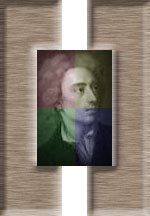 Alexander Pope was born in London on May 21, 1688 to Alexander Pope and his second wife Edith Turner. He was regarded as the greatest English poet of the early eighteenth century.
Alexander Pope was born in London on May 21, 1688 to Alexander Pope and his second wife Edith Turner. He was regarded as the greatest English poet of the early eighteenth century.He was taught to read by his aunt and then sent to schools at Twyford and at Hyde Park Corner. He suffered from different health problems early at his childhood which deformed his body, stunned his growth and causing end his life at the age of 56 in 1744.
Alexander Pope's family moved in 1700 to small estate in Binfield, Berkshire. The poet described the countryside in the area in his poem "Windsor Forest". He embarked on an extensive reading in English, French, Italian, Latin and Greek poetry, through which he got those languages by reading those stories to please himself as he wrote in his biography.
Alexander Pope began his early literally career when his first volume of "Poetical Miscellanies" published in 1709 and then "The Pastorals" both of which were followed by "An Essay on Criticism" on 1711, made him fame. Alexander Pope published "Windsor Forest" on 1713 as a topographical poem celebrating the "Tory Peace" at the end of the "War of the Spanish Succession".
Alexander Pope had been mesmerized by Homer since his childhood, so he announced his thought to translate Homer's "Iliad" in 1713, which he did later when that work appeared duly between 1715 and 1720.
Alexander Pope published "Epistle to Burlington" on 1731. The first four poems from that work grouped under that title of "Moral Essays" which he published on 1735. He wrote "Essay on Man" on 1733-1734, and then followed it by the "Imitations of Horace" on 1733-1738.
Alexander Pope died on May 30, 1744 and buried at the Church of St Mary the Virgin in Twickenham.




No comments:
Post a Comment